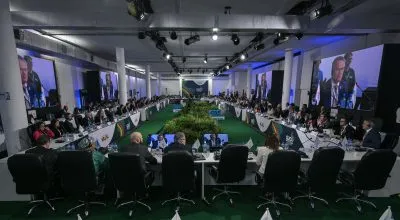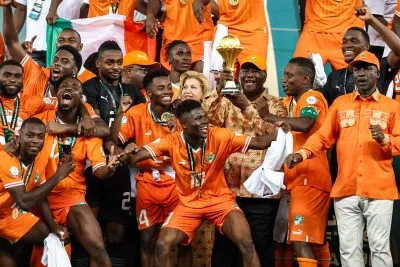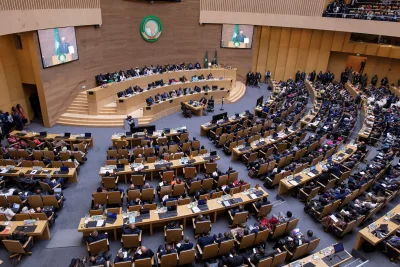Eight years now appears to be the longest term the Ghanaian electorate is prepared to give any president they elect. In 2000, the people voted out President Jerry John Rawlings’ National Democratic Congress (NDC) when he was about to finish his second four-year term.
The rallying cry then was ‘change’. ‘Change’ again became the rallying cry in the 2008 elections in Ghana, the most closely fought in the country’s 52 years of independence. It ended eight years of rule by National Patriotic Party (NPP) – headed by outgoing President John Kufuor, who was unable to run in the 2008 elections because of presidential term limits – which was soundly beaten in the parliamentary elections, but lost narrowly in the presidential race to the NDC’s Professor John Atta Mills.
Kufuor, like Rawlings before him, was finishing his second four-year term, and the electorate, yearning for change, was not prepared to let his party continue in power. Thus, in what has been described as ‘the coming of the third John’ (Atta Mills is the third consecutive John to be elected president of Ghana in 17 years), NDC supporters celebrate the ‘dawn of a new era’ at President John Atta Mills’ inauguration in Accra.
The man who was contesting the presidency for the third time (Mills had lost twice to Kufuor in 2000 and 2004), become the preferred national bridegroom. This was despite the flashy American style campaigning by the NPP and its presidential candidate, Nana Akufo-Addo.
Mills won because the NPP committed error upon error both before and during the elections. In addition, he won because the majority of the people simply wanted change! After eight years in which Kufuor and the NPP had done what they could to bring some real improvements to the economy and social services such as education and health, ‘the sin of incumbency’ (as one Ghanaian pundit has described the infractions and scandals that bedevilled Kufuor’s last years) was so great that the people were not prepared to consider the roads that Kufuor built, or the free maternity care and free school-feeding programme that his government had introduced, as sufficient sweeteners to give the NPP a new term.
NPP stalwarts also admit that President Barack Obama’s victory in the US elections, held a month before the Ghanaian elections, did not help the party. Obama had campaigned on a ticket of change – “Change We Can Trust” was his rallying call – and his message had resonated in Ghana, especially when the NPP as a party had fashioned itself on the Republican Party of the US; it has the same ideology, the same elephant symbol, and the same blue-white-and-red party colours.
Thus, when ‘change’ pushed the Republican elephant out of the White House, the misfortune followed the NPP elephant in Ghana. Same animal, same fate.
Arrogant and uncaring Also, the majority of the NPP top brass were generally seen as arrogant and uncaring. While people complained of hard times, unemployment and the failure to see the prosperity the government talked about in their pockets, some government ministers and NPP apparatchiks were flaunting their new-found wealth in the form of 4×4 vehicles with tinted windows, multiple houses, new (and sometimes dodgy) businesses, etc.
The majority of the people were not prepared to forgive such insensitivity. Even the most committed NPP supporter now admits that the party’s top brass and government did not look after the foot soldiers and wealth was concentrated in too few hands.
Thus when the elections came, the NPP members of parliament took the full blunt. Before the first round on 7 December, the NPP had 128 seats in the 230-seat parliament as against the NDC’s 92.
When the dust had settled, the NDC had overturned the tables with a neat 114-seat victory over the NPP’s now 107 seats. In effect, the NDC had gained 22 seats while the NPP had lost 21.
On top of it, the NDC had won in seven of the country’s 10 regions, leaving the NPP with only three, which were traditional NPP strongholds anyway. In the presidential race, the story was somehow different.
The NPP’s Akufo-Addo managed a small lead over Atta Mills in the first round but it was not enough to take him across the winning line. The scoreboard showed Akufo-Addo with 49.13% of the vote (or in real numbers, 4,159,439 votes) as against Atta Mills’ 47.92% (4,056,634) a difference of a mere 1.21% (or 102,805 votes. It was that close.
Ghana’s constitution stipulates that: ‘A person shall not be elected as president of Ghana unless at the presidential election the number of votes cast in his favour is more than 50% of the total number of votes cast at the election.’ The magic number is ‘more than 50%’ and as none of the candidates had the required margin, they had to fight it out again in a second round on 28 December.
Election history in Ghana favoured Akufo-Addo to win, as previously any candidate who had led in the first round of the presidential race had gone on to win the second round. Somehow, Atta Mills made nonsense of all that history and overturned Akufo-Addo’s 102,805 vote first-round lead into a 23,055 vote victory in the second round. Mills gained 50.13% while AkufoAddo obtained 49.87% of the vote.
But Mills could not be declared the winner because one constituency in the Brong Ahafo Region (a swing constituency called Tain, with a registered voter population of 53,890) could not vote on 28 December. And so, a ‘third round’ or a ‘tiebreaker’ was held in Tain on 2 January.
Interestingly, Tain had voted NPP in 2004 but swung to the NDC in 2008 in the first round. It is here that the NPP, perhaps calculating that mathematically Tain was a lost cause, threw the election away by boycotting the tiebreaker on the fantastic excuse that there was insecurity in the constituency and also that 1,800 ballots had gone missing there during the second round.
The Electoral Commission rejected the NPP allegations, and duly declared Mills (who polled a further 19,566 votes in Tain taking his lead to 50.23% against Akufo-Addo’s 49.77%) the winner, sparking wild scenes of jubilation among his supporters nationwide.
Principles of affordability At his inauguration, Mills told the business community: “Our goal is to facilitate the creation of a business environment that balances the resuscitation and growth of local industries and enterprises with operations of foreign businesses considered essential to the creation of a robust national economy.
“We will not pursue a policy that sees Ghanaian industries suffering from unfair competition. Our local businesses will be encouraged to create jobs and play their role in growing the Ghanaian economy. And we will strive to balance the efficiency of the market with the compassion of the state.”
With its social democratic outlook, Mills’ ruling NDC party believes in funding development through efficient, effective, and equitable taxation of all citizens based on the principle of affordability. During the elections, the party campaigned on the promise of not introducing any new taxes. Instead, it will introduce reforms in tax administration, and shift from reliance on direct taxes to indirect taxes.
On the whole, the government’s economic objectives will be anchored on a macroeconomic strategy consistent with the attainment of single-digit inflation, exchange rate stability and a balanced budget with a deficit target not exceeding 3% in any given year, and a growth rate of at least 8%. Of course, it is easier said than done, and the people are waiting and watching to see if the new government can walk the talk.
Baffour Ankomah
Want to continue reading? Subscribe today.
You've read all your free articles for this month! Subscribe now to enjoy full access to our content.
Digital Monthly
£8.00 / month
Receive full unlimited access to our articles, opinions, podcasts and more.
Digital Yearly
£70.00 / year
Our best value offer - save £26 and gain access to all of our digital content for an entire year!
 Sign in with Google
Sign in with Google 



